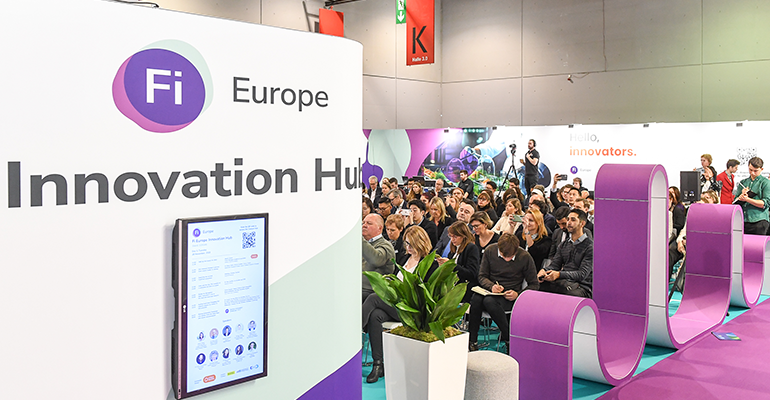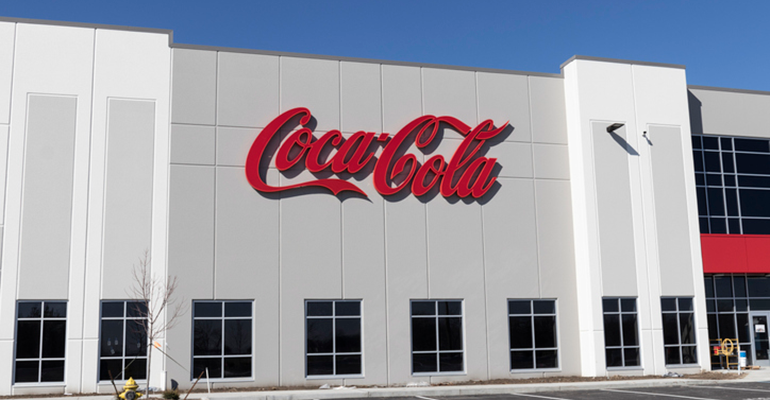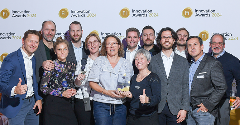News
Coca-Cola: Artificial intelligence could help vet open innovation partners
18 Dec 2023
Artificial Intelligence (AI) could have a role to play in selecting startups and projects that corporates work with in open innovation partnerships, said Faisal Zanjani, global head of open innovation at The Coca-Cola Company, at Fi Europe.
In a presentation entitled Recipe for Disruption: Open innovation’s role in the food and beverage industry, Zanjani emphasised that some of the simplest and least glamorous ideas could be the strongest contenders for Open Innovation (OI) partnership.

As a case study to illustrate how OI can work, he discussed the 100+ accelerator, first established by AB InBev in 2018, and focused on sustainability. Coca-Cola, along with Colgate, Palmolive and Unilever, joined three years later.
“This year, we had over 2,000 applications for 100+,” Zanjani explained to his audience at the Fi Europe Innovation Hub. “We narrowed that down to a few hundred. We pay startups to run their experiments with us. It might be upcycling or could be related to emissions or climate action.”
AI can augment – not replace – humans
The process of reducing 2,000 solutions to between 400 and 500 is currently entrusted to an agency. Expert interviewers from each of the four corporates behind the accelerator then whittle this total down to a short-list of 200 or so.
“Getting from the initial 2,000 companies to 400, you could do that much faster with AI, and without biases being involved. Human biases always kick in.”
Talking in general terms about these types of function, he added the important clarification: “AI is only going to augment human. It’s not replacing human yet, and it’s a fairly safe bet that human involvement will continue for some time to come.”
Diversity is key in startup selection
Zanjani also made the point that 100+ is only one of the accelerators in which Coca-Cola participates. Others relate to areas including flavours and ingredients, processes, sensors and Industry 4.0.
Regarding the 100+ accelerator, which closed its fourth cohort in September this year, he underscored the diversity of the selected partners. “We experimented with or accelerated 116 solutions, coming from 30 different countries,” he said. Nearly 60% of these had women founders and close to a half were defined as ‘young’. Some 40% were from Africa and 15% from Asia Pacific.
He emphasised that, in applying to join an accelerator, a startup should “already have a certain level of product in place”.
 © iStock/jetcityimage
© iStock/jetcityimage
Big innovation can come from small solutions
Applicants should also ensure that their solution answers a need or solves a problem. Then again, he said, innovation does not have to operate on an eye-catching or spectacular level.
“You’d be surprised that, if you save 10 minutes of clean-in-place (CIP) process – washing, which is the most boring thing you can imagine – or a little bit of caustic in the washing process, it can save you tonnes of CO2, tonnes of money, and a lot of water,” Zanjani explained. “That would probably get prioritised over a very fancy solution that had all the bells and whistles, but which couldn’t be executed.”
Why should corporates pursue Open Innovation?
Zanjani also listed the three broad reasons why a large business such as Coca-Cola should use OI. Firstly, he said, “No single entity has all the smart ideas; we have to look beyond our four walls.” He pointed out that, while there were some 30,000 publicly listed companies around the world, the number of privately held businesses was closer to 330 million.
Secondly, he explained, certain types of innovation may be more successful when originating outside the organisation. “A lot of large companies are not as good at disrupting themselves or their own industries,” he stated. “Certain characteristics of these innovations will work better for a new entrant or startup, rather than for a large corporation.”
His final reason was that, for a business to “try to do everything” itself was highly inefficient, from the point of view both of money and effort.
Related news

Oat Barista: Innovation for game-changing beverages
20 Nov 2025
Oat Barista is a clean label, sustainable, and innovative drink base specifically designed to create the perfect foam in one single ingredient.
Read more
Nitrites: Pressure grows on UK to follow EU’s lead
20 Nov 2025
Pressure is growing on the UK to follow the EU’s lead after the bloc revised its regulations on the permitted levels of nitrites and nitrates in cured meats.
Read more
Empowering innovation in fortification and colouration
13 Nov 2025
Divi’s Nutraceuticals offers a large portfolio of innovative, high-quality ingredients for foods, beverages, and supplements, with bespoke solutions and expert support for product success.
Read more
Danone highlights digestive health as potential ‘tipping point’ for food industry
13 Nov 2025
Danone is betting on a food industry “tipping point” that will bloat the market for healthy products, particularly those related to gut health.
Read more
Standing Ovation and Bel scale up casein production from dairy co-products
11 Nov 2025
Foodtech company Standing Ovation has partnered with cheese specialist Bel Group to manufacture dairy serums for industrial-scale casein production via precision fermentation.
Read more
AI attraction means foodtech startups must ‘prove’ rather than ‘promise’
4 Nov 2025
Reports suggest that artificial intelligence (AI) is sucking investment from foodtech and agritech, but investors say the picture is complicated.
Read more
Will postbiotics become the go-to functional ingredient?
3 Nov 2025
Postbiotics show significant promise for the functional foods market due to their safety profile and beneficial bioactive properties, research suggests.
Read more
Meet the finalists of the Fi Europe Innovation Awards 2025
31 Oct 2025
Who made it to the shortlist of the Fi Europe Innovation Awards 2025? Read about the 23 companies making food and drink products healthier and manufacturing processes more efficient.
Read more
Penguin and Club bars no longer classed as chocolate
30 Oct 2025
Penguin and Club bars can no longer be classified as chocolate after the pladis-owned McVitie’s brands turned to cheaper alternatives amid the ongoing cocoa crisis.
Read more
Shorter drying time, sweeter success!
30 Oct 2025
Curious about cost-effective, sustainable and delicious candy making? Stefan Wessel reveals how Avebe’s solutions reduce drying time and energy use by up to 50%.
Read more